(11:30AM – promoted by Nightprowlkitty)
Burning the Midnight Oil for Living Energy Independence
It seems as if many people have been paying more attention to the Beckapalooza in DC … and the whole furor had me initially confused, as originally I thought it was something to do with Beck the Mongolian Chop Squad …
But last weekend, there was an election in Australia, and on the night it seemed like it could be the closest in Australian history. As the week went on, that proved to be the case. And I got to thinking, listening to the various independents that hold the balance of power, that there could well be an unlikely working partnership available, where trains could help delivered a progressive governing majority on the most improbable of foundations.
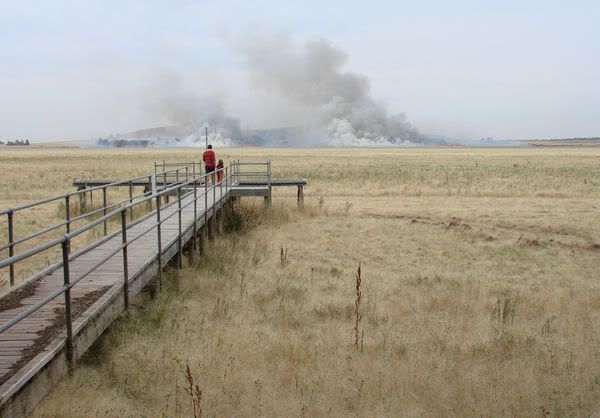
NB: the grassfire in a dry lake bed shot that I use on occasion is in fact from Australia, suffering what has been characterized as a long running drought, but what seems more likely to be a secular shift to a dryer climate.
The Election Results
It took until around Thursday morning our time, and for some close seats the election prediction swung back and forth several times before settling down, but with 83.4% of the vote now counted, the predicted outcome for the 150 seat House of Representatives, with 76 seats required to form government, is:
- 73 seats for the right leaning Liberal Party / National Party coalition (with a caveat)
- 72 seats for the center to center-left ALP, or Australian Labor Party
- 1 seat for the Australian Greens
- and 4 independents, in far north Queensland, northern New South Wales, and the island of Tasmania
This was a snap election called by the fairly recently installed Prime Minister Julia Gillard, after a party room vote removed the former ALP Prime Minister Kevin Rudd from the ALP leadership. And the ALP clearly lost the election, losing 16 seats and their majority, including losing the seat of urban seat of Melbourne, to the Greens, which they had held since Federation and losing their 5 out of 5 dominance of Tasmania to Andrew Wilkie, who had resigned from his position as a government intelligence analyst in 2003 to blow the whistle on the lies in the political build-up to going to war.
At the same time, the Coalition did not win, either. The Coalition is the working arrangement between the more urban-focused conservative “Liberal” party (liberal like Neoliberal, that is, not liberal like socially liberal ~ especially after they were taken further to the right by the former Liberal MP John Howard, who was PM for the entirety of my decade in Australia), and the country-based National Party (which indeed was originally named the “Country” party). And while the National Party is in coalition with the Liberal Party in most of the country, in Western Australia, they did not run in coalition and indeed the incoming National Party MP from Western Australia, Tony Cook, beat an incumbent Liberal Party MP for the seat. Running from the outset as “independent”
of the Coalition, Tony Cook is demanding a scheme of the Federal Government topping up a regional infrastructure scheme funded by minerals royalty payments as the price of his support for a Coalition government.
However, with “independent” National who will be sitting in the cross benches but clearly leaning to support the Coalition, and an Australian Greens MP who has said he wants “stable, effective and progressive government” and that he sees the ALP as in the best position to deliver on the demand, the two parties are in effect each sitting at 73 seats, three seats short of a majority, with four regional capital-I Independents, in the sense of sitting in no party room, holding the balance of power.
The Strange Gang of Three, Who Are Not A Bloc
Three of the Independents have been meeting with the caretaker PM, Julia Gillard, and the leader of the opposition, Tony Abbot, as a group, though they are no bloc, as New England MP Tony Windsor is eager to explain at every available opportunity. The fourth, the Tasmanian whistleblower Wilkie, has been meeting with the prospective Prime Ministers and others … erh, Independently.
Who are they? Australia’s ABC gives a wrap up:
Bob Katter
Background
- Member for Kennedy in outback Queensland since 1993
- Was with the National Party until 2001 but left to run as an independent
- Left the Nationals so he could better represent issues in his electorate
- Easily retained his seat in all the elections since 2001
- Kennedy is a family affair for Katter – his father Bob Katter Senior held the seat from 1966 to 1990
- Bob Katter Senior was a Labor politician but later joined the Nationals
- Was a Queensland MP from 1974 to 1992 and a strong supporter of controversial ex-premier Joh Bjelke-Petersen
- Describes himself as a “wild boy from wild country”
- Before the election he said he would work with the Greens if there was a hung Parliament
Issues
- Mr Katter says the survival of rural Australia will be his top priority
- Even though he rejects computers, he has already named broadband as a big issue
- Has called for more more investment in ethanol
- Opposed to privatisation and economic deregulation
- He says a privatised NBN will not work, saying “privatised Telstra has been absolutely disastrous for rural Australia”
- He is against banana, beef and other primary produce imports
- He wants to bring back agricultural subsidies and tariffs
- Mr Katter is a climate change sceptic and is against an emissions trading scheme
Tony Windsor
Background
- Has a farming background and is a primary producer
- An active participant in innumerable rural and community groups
- Holds a Bachelor of Economics from the University of New England
- Mr Windsor is the incumbent independent Member for the northern NSW seat of New England
- A former National Party member
- Was defeated in a National Party pre-selection ballot in NSW in 1991
- Went on to win the election as an independent and remained NSW independent MP until 2001
- Held the balance of power with three other independents in NSW
- Switched to federal politics in 2001, defeating the incumbent Nationals member in New England
- Won New England on preferences in 2001, increased his primary vote to 57 per cent in 2004 and nearly 62 per cent in 2007
- In 2004 Mr Windsor claimed then-deputy PM John Anderson and a Nationals senator bribed him to quit his seat
- Recently came under fire from other candidates over the sale and release of his farm to a mining company
Issues
- Mr Windsor says he would do a deal with either major party
- Mr Windsor has named broadband as a key issue
- He also says a main issue is the “stability of the nation”
- Has been heavily involved in the climate change debate
- Claims credit for some ideas which have been picked up including the Renewable Energy Institute and bringing the issue of soil carbon to a national level
Rob Oakeshott
Background
- Member for mid-north NSW coast seat of Lyne since 2008 by-election
- Former National Party member but left the party so he could better represent his electorate
- Was a NSW Nationals MP until 2008 when he resigned to run for Lyne
- Holds a Bachelor of Arts with Honours in Government
- Has described his views as economically conservative and socially progressive
- Mr Oakeshott won an easy victory at the September 2008 by-election
- Before the election he said there was nothing to fear from a hung parliament
- He said a hung parliament would increase the influence of all politicians, not just those in the balance of power
Issues
- Mr Oakeshott says he is undecided on who he will side with
- He names climate change as a top priority
- He says an emissions trading scheme should be a key policy of any government he will help form
- He has also called for a fair go for regional and rural Australia
- Names the make-up of the Senate, the stability of the government and his electorate’s needs as key issues
So a socially conservative, agricultural-protectionist, climate-science denying rural MP from far north Queenslands, a socially moderate conservative, pro-regional development, supporter of pro-active climate change policy on the precautionary principle, and an “economically conservative, socially liberal” pro-regional development MP who says that the vast majority of climate scientists say there’s a problem, that an eminent economist devised a scheme, and then it went awry.
If they vote the wishes of their electorates, they will support Coalition government: there is deep-seated distrust of the Australian Labor Party among many rural producers in most country areas, and one of the issues in the campaign that the Coalition turned to its advantage in many rural and regional areas was a proposal to shift from royalty-based payments for mineral resources to a profits-tax based system.
And of course, an ALP government is no guarantee of progressive government, with one of the principle causes of the loss in public confidence in Kevin Rudd and then the failure of the ALP in last weekend’s election was the failure to deliver on a carbon pricing scheme.
Carbon and Climate Change policy
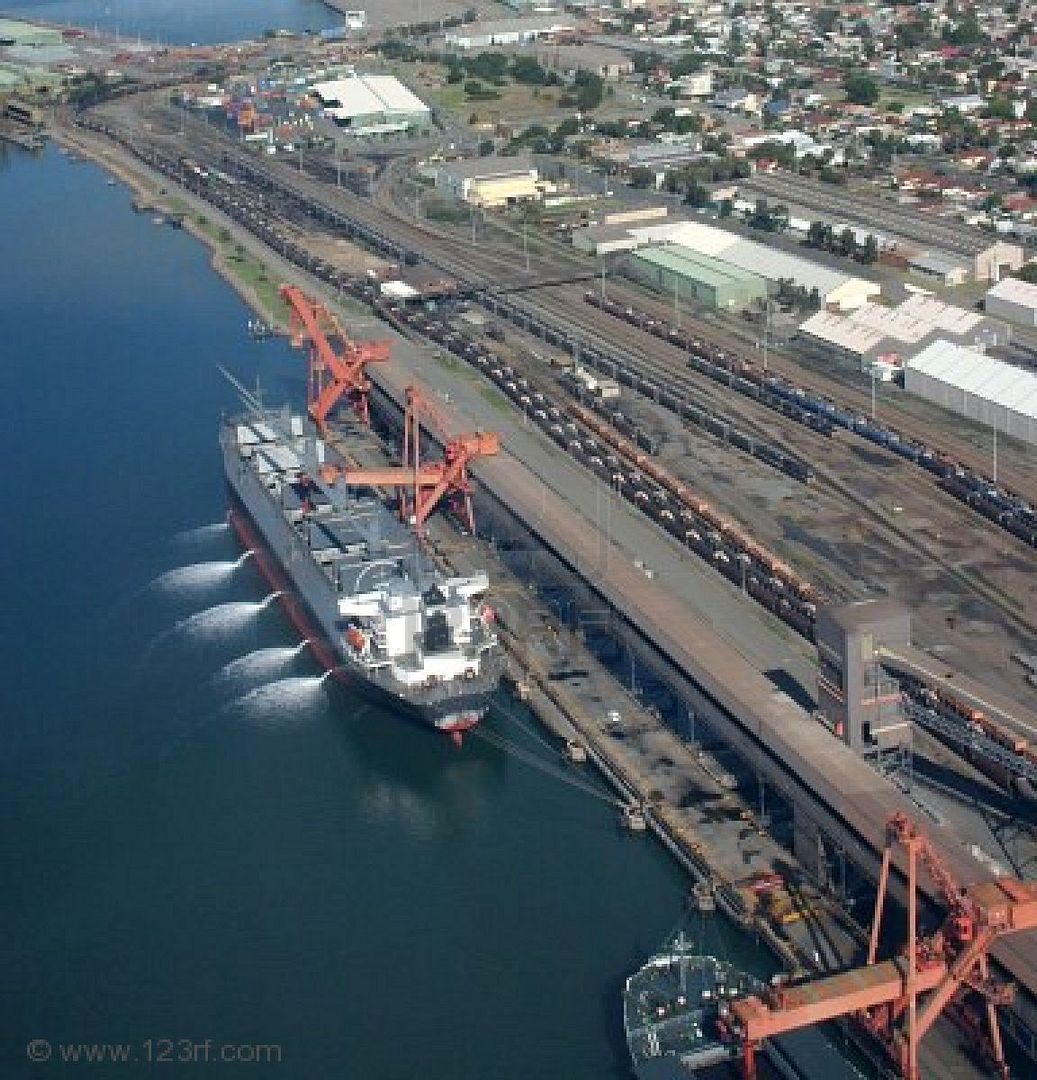 Bob Katter has discussed his opposition to climate change policy in terms of two distinct problems. The first is opposition to the financial traders in Sydney and Melbourne playing financial games with tradable permits. The second is in terms of the economic viability of regional areas, which have seen loss in markets for agricultural products with the last three decades policies of freeing up trade, and have become increasingly reliant on mining for economic survival. And the three main outputs of Australian mines are coal, iron ore, and aluminum.
Bob Katter has discussed his opposition to climate change policy in terms of two distinct problems. The first is opposition to the financial traders in Sydney and Melbourne playing financial games with tradable permits. The second is in terms of the economic viability of regional areas, which have seen loss in markets for agricultural products with the last three decades policies of freeing up trade, and have become increasingly reliant on mining for economic survival. And the three main outputs of Australian mines are coal, iron ore, and aluminum.
Addressing the complaint about financial games with tradable permits is the most straightforward, by replacing the unnecessarily complex carbon trading scheme with a carbon permit auction scheme. Placing the permits as high upstream as practicable, to be held in registered accounts by individuals or firms selling the covered CO2 emitting sources, and only allowing them to be traded between holders of registered accounts … which is to say, cutting the financial market speculators entirely out of the loop … would satisfy some, though not all, of that complaint.
The balance of the complaint is a far more fundamental problem. But of course, a carbon fee is not an energy fee across the board, but rather a fee on energy from combustion of carbon. Australia is in a position to rapidly expand its reliance on carbon neutral power, and with it to gain a substantial degree of independence of aluminum production from the impact of any carbon fees.
And of course, China is approaching the point of Peak Coal, after which time a permit system on carbon emissions that included coal exports would push the domestic Australian economy toward being completely carbon neutral.
So a fundamental compromise would be to exempt exports for an eight year period, during which times there is a massive ramp-up in investment in carbon-neutral power productions, and phase bringing exports within the carbon cap over the following eight year period.
It must be stressed that this is no side-deal: a genuine carbon permit system, capped at current levels of domestic emission and bringing Australia’s exports within the cap in the next sixteen years represents, on the one hand, a substantial stretching out of the exploitation of Australia’s coal resources into the decades when the combination of Peal Oil and Peak Coal will be turning it into something that is too valuable to burn.
And on the other hand, it implies a wholesale shift of the Australian domestic economy into reliance on sustainable, renewable energy. This means many things, but one of the things it means is a reversal of the flow of jobs and population out of Australia’s regional areas, because the new sustainable, renewable energy sources will require more labor input per BTU than the tradition coal, crude oil, and natural gas based power system. These places will, of course, need to make sure that their workers are suitably protected while on the job with equipment from places like BIG Safety making sure that the risk of any injuries occurring are reduced as much as possible.
Bob Katter and Ethanol
 Bob Katter is a big proponent of Ethanol. He has seen the Ethanol fueled cars of Brazil, and as an MP representing a sugar-growing region, he wants the same in Australia.
Bob Katter is a big proponent of Ethanol. He has seen the Ethanol fueled cars of Brazil, and as an MP representing a sugar-growing region, he wants the same in Australia.
And while an ethanol policy designed by Bob Katter would almost certainly be the kind of environmental disaster as the corn-starch ethanol policy instituted to pander to the states of the old High Grass Prairie … if it is necessary that the ethanol policy be a sustainable, green, ethanol policy rather than a soil-mining, extractive brown ethanol policy … well, that would also be good for the sugar producers.
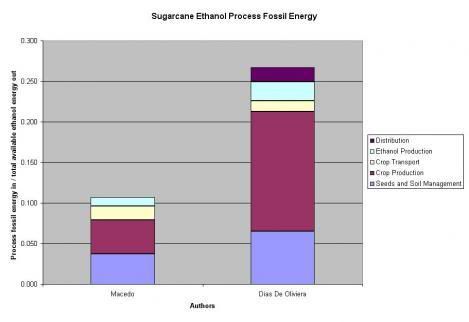 Because, unlike corn starch, Sugar Ethanol can indeed be produced in a sustainable, renewable way. If the sugar itself is cultivated in a renewable way, and the conversion of bagasse to heat to support the process is done in an appropriate way, Sugar Cane can be converted into ethanol with substantially better than 200% net energy return on energy investment. As illustrated in the left, estimates of energy inputs into Sugar Cane Ethanol range from ~11% to ~27%, implying a gross energy return on investment of from 3.7:1 to 9:1. Even the more conservative estimate is above the 3:1 threshold required to maintain the component of the transportation system that remains organized along current late-20th century lines.
Because, unlike corn starch, Sugar Ethanol can indeed be produced in a sustainable, renewable way. If the sugar itself is cultivated in a renewable way, and the conversion of bagasse to heat to support the process is done in an appropriate way, Sugar Cane can be converted into ethanol with substantially better than 200% net energy return on energy investment. As illustrated in the left, estimates of energy inputs into Sugar Cane Ethanol range from ~11% to ~27%, implying a gross energy return on investment of from 3.7:1 to 9:1. Even the more conservative estimate is above the 3:1 threshold required to maintain the component of the transportation system that remains organized along current late-20th century lines.
As in the US, the foundation of the scheme would be exemption from motor vehicle fuel tax for biofuels, including the ethanol component of an ethanol-gasoline mix. Unlike the US, however, since Australia is a nation with available sugar-cane growing regions, this tax-exemption would be limited to domestically produced ethanol with a gross energy return on energy invested of 300% or better, essentially limiting the exemption to domestic sugar cane ethanol and to biodiesel produced from energy-frugal oil-bearing crops. With this in mind, businesses hoping to make the most of this tax exemption would need to work closely with some of the best Tax Accountants Perth has to offer to ensure that their company would be eligible for this particular form of tax-exemption. Besides, when running a business, working with a team of tax experts is crucial to ensure that your accounting efforts are in order.
Added to this would be ecological husbandry payments to qualifying biofuel producers who met objective standard in ongoing improvement of soil and watershed conditions toward a desirable (and attainable) level and maintenance of those standards once met.
I don’t have access to the information on which to run the numbers, but if a reasonable percentage of the carbon permit auction scheme does not suffice to cover the motor vehicle fuel tax exemption and the soil and watershed husbandry payments, then surely an import tariff on Australia’s growing oil imports would suffice. Doing this in a budget-neutral way, of course, would be to placate the “economically conservative” Rob Oakshott.
But, Won’t Transport Grind To a Halt
Still, a serious carbon fee system will run into two of the same problems in Australia that it faces in the United States: the oil-addiction of the transport system and the coal-addiction of the electricity generation system.
And the Steel Interstate offers the same combination of benefits on both fronts.
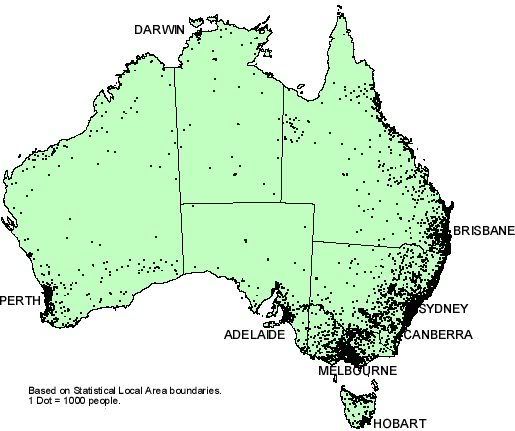 This is even more striking in Australia, where 2/3 of the Australian population lives in the five mainland state capitals, and 80% of the population lives in the ten largest cities – so no wonder people are looking to read more about how they can sell properties in and around these areas given that the market is so competitive. Indeed, this population distribution lies behind both the continued existence of a distinct “country” conservative party, its ongoing decline in representation, and the resulting compromises with the largely urban bases Liberals that led to the election of the three regional Independent MP’s from what would otherwise be stereotyped as National Party seats.
This is even more striking in Australia, where 2/3 of the Australian population lives in the five mainland state capitals, and 80% of the population lives in the ten largest cities – so no wonder people are looking to read more about how they can sell properties in and around these areas given that the market is so competitive. Indeed, this population distribution lies behind both the continued existence of a distinct “country” conservative party, its ongoing decline in representation, and the resulting compromises with the largely urban bases Liberals that led to the election of the three regional Independent MP’s from what would otherwise be stereotyped as National Party seats.
Indeed, the ALP proposed to proceed with the frequently-proposed Australian High Speed Rail corridor from Melbourne to Brisbane, through the heart of the eastern seaboard population centers of Australia, including not only Melbourne, Sydney and Brisbane, but also sixth, seventh and eighth largest cities of Gold Coast, south of Brisbane, Newcastle, north of Sydney, and Canberra, north of Melbourne and southwest of Sydney in the Australian Capital Territory.
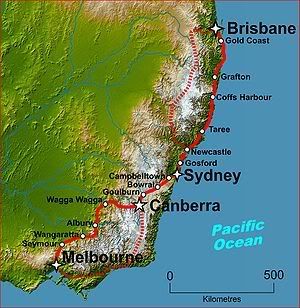 And while the ALP’s failure to propose a carbon fee system that could get passed was in large part responsible for its defeat, the fact that it retains a chance to form minority government may be due to the HSR promise, with the ALP retaining a seat north of Sydney along the line of the promised first phase that it held on a razor thing margin and would have lost based on the national swing against the ALP.
And while the ALP’s failure to propose a carbon fee system that could get passed was in large part responsible for its defeat, the fact that it retains a chance to form minority government may be due to the HSR promise, with the ALP retaining a seat north of Sydney along the line of the promised first phase that it held on a razor thing margin and would have lost based on the national swing against the ALP.
But HSR is not enough. It is also necessary to provide an alternative to reliance on diesel road freight.
A Steel Interstate for Australia
Below is a map of the major intercity passenger rail services in Australia, but it also serves quite well as a sketch of the bulk of the required Steel Interstate system, both for allowing freight transport to move between the main metropolitan centers of the nation without reliance on crude oil, and for connecting all of the main electricity consumption regions with the enormous, in per capita terms, sustainable renewable energy resources available across the Australian continent, with ultra high voltage direct current transmission lines sharing the corridor with 25kV AC rail power supply lines. Freight transport is becoming increasingly popular in Australia, particularly in the Brisbane area.
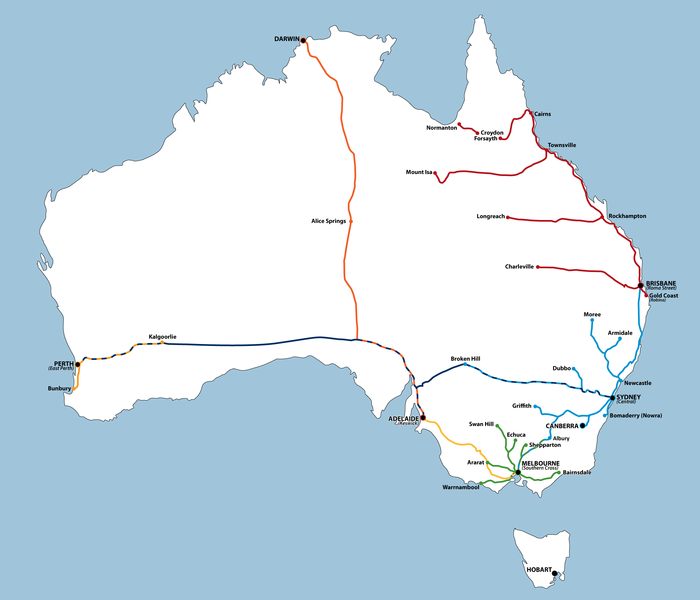
It can be seen as basically three lines:
- The Eastern Seaboard line from Melbourne to Brisbane and then Cairns in tropical Queensland, alone the eastern coast
- the Eastern Transcontinental from Sydney to Perth, and
- the Northern Transcontinental from Melbourne to Darwin via Adelaide
To these can be added a fourth. With Sydney as the largest city, it is necessary to connect Melbourne and Sydney, and also Sydney and Melbourne. However, that connection implies running through metropolitan Sydney, with its heavily used and underbuilt metropolitan rail system leading to substantial bottlenecks, as well as coping at various points along the way with challenges posed by the Dividing Range. And so, connecting Melbourne to Brisbane is done most effectively by a second route that runs inland.
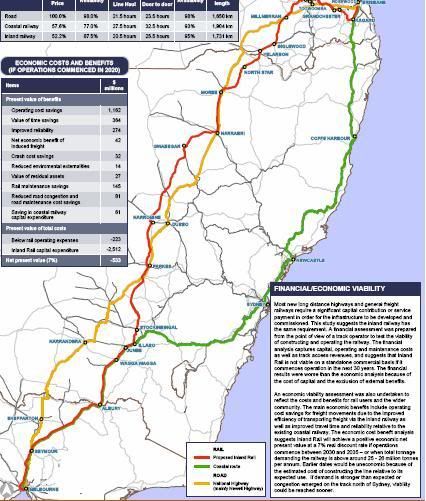 The most recent study of this very-well-studied proposal finds economic benefits on the order of $2.2b and economics costs on the order of $2.7b.
The most recent study of this very-well-studied proposal finds economic benefits on the order of $2.2b and economics costs on the order of $2.7b.
That is, however, at an interest rate of 7%, and without counting the benefits of restoration of Australia’s position as a net oil exporter in an age of Peak Oil. In the framework of national scheme to provide for a Steel Interstate and Electricity Superhighway grid, the Inland Rail Expressway ought to be included as the fourth of the eligible transcontinental route.
The Steel Interstate must be fully funded, of course, given Rob Oakshott’s “conservative economic” leanings, but as in the US, this funding can be in the form of an interest subsidy while the capital cost is refunded out of user fees. Natural funding sources are an imported crude oil tariff, for an immediate source of funds, and then a designated percentage of carbon auction revenue.
So, would that work
Now, I am not saying that any of this is a sure thing. Bob Katter might be persuaded by a Sugar Cane Ethanol program and northern Queensland Steel Interstate … and then again, he might not be. After all, he does reckon that he knows better about how the climate works than 90%+ of climate scientists, so he’s an awfully bright fellow (in his own estimation at least), and certainly too clever for me to be able to predict.
But its worth a go. And setting the program out will at the least get the ideas out there … since Federal Elections come every three years (at least), there may still be time to win the next election for an environmentally sustainable Australian economy, despite the reluctance of the ALP and obstinate refusal of the Coalition to pursue it.
Midnight Oil ~ Truganini
Of course, more likely, in the words of the ALP Minister for the Environment, there’s a road train going nowhere.

1 comments
Author
… to our Troubled Evolution.
Our So-called Leaders Speak
With Words they try to Jail Yah
They Subjegate the Meek
but its the Rhetoric of Failure